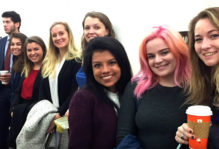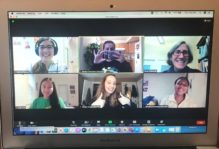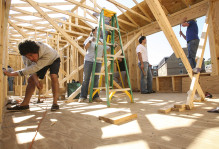Working for Haitian Empowerment
Just over a week ago, Hurricane Tomas brushed the west coast of Haiti, exacerbating an already tragic and desperate situation after the cholera outbreak and January’s earthquake. As it approached, I was following the news, tracking weather maps and journaling in my downtime. Such an event has been anticipated – and dreaded – since the earthquake forced 1.3 million people into tent communities. And still, having known that it was likely to happen sooner or later somehow did not make the arrival of the hurricane any less difficult. Though seven people lost their lives from Tomas (and many more in other countries) and flooding has taken a heavy toll around Haiti, the hit was not as direct as it could have been.
My mind and heart are on Haiti a lot these days, having been there this past June and preparing to return this January. I’ll be traveling to Port-au-Prince with a group of seven students, working with Mennonite Central Committee and International Child Care – Grace Children’s Hospital, as part of our Branch Out International alternative breaks program.
On our trip, we’ll be exploring the root causes of poverty, the connections to colonialism and racism, and the effects of that poverty in communities around Port-au-Prince. We’ll be working on issues of public health with Grace Children’s Hospital, side by side with community workers from tent camps and health professionals in the hospital. We’ll be experiencing the many ways smart, creative and tireless folks in Haiti are working together to rebuild their country, and we’ll be figuring out ways we can advocate for and support them.
This trip is a big step for us as a College, but it’s also part of a bigger, national effort. William and Mary is part of the Haiti Compact, a group of five universities and the national alternative breaks organization, Break Away. Together, we are working to develop ways for US university students to become involved in Haiti’s empowerment in the midst of their rebuilding. Our hope is that in the course of the next several years, campuses across North America will be deeply involved in work for Haitian empowerment and contributing to rebuilding that leads to long-term sustainability.
Political and social issues in Haiti are immensely complex, and it is clear that our little group of eight won’t be able to address them all during our two week visit. Our alternative breaks aren’t about solving problems on that scale – that’s best done by locals in the countries we travel to. Our trips are about working alongside people to help them reach their own goals, and to learn from them. Then we can tell others what we learned and speak up for Haitian empowerment to those in power and those who can add their voices. As part of a larger movement, we will be working for a shift in thinking and an increase in knowledge and action among campuses all over the US, to help chip away at the inequalities and policies that have kept Haiti from being able to fully live into its empowerment and beauty.
And in the meantime, we’ll be holding our breath until those 1.3 million people who have been displaced are in stable, weather-proof homes.




No comments.
Comments are currently closed. Comments are closed on all posts older than one year, and for those in our archive.